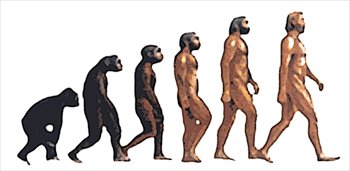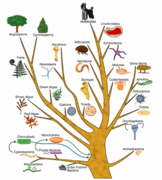CreationSpot
Assumptions and Worldviews
When approaching any particular subject, we need to be aware of our own limitations. We are biased. Our minds have been programmed into a certain format. We have belief systems. These things can hinder us, or they may be of great value in understanding the world around us.
____________________
We Begin With Assumptions
We begin with assumptions we believe to be true.
When we approach a particular subject regarding the natural world around us, our understanding of it will be influenced by our worldview. Our worldview is built on the information we have received and which we assume to be true. So our worldview is based on our assumptions. In like manner, our worldview will lead to further assumptions that agree with our accepted understanding of the world around us.
While there are many varieties of evolutionary worldviews, the primary view taught in the educational institutions here in the United States assumes that the world is not created, but a process of time and chance leading to changes over millions (and even billions) of years. This assumption is believed to have been tested and proven, so that theories such as the Big Bang, abiogenesis, and evolution are viewed without question as the sources for the origins of the universe, our planet, and all life as we know it.
Creationists see the world as the result of a Creator. We assume God. Our assumption is believed to have been tried and proven, so that without question we believe that God is the source, not only of the origin of all things, but also the Sustainer who keeps everything working.
____________________
Worldviews
Your worldview is the belief system you have accepted that helps you understand the world around you. An atheist, for example, will not understand the world in the same way that is acceptable for a Hindu. A Hindu believes in many gods, while an atheist believes in no god at all.
Worldviews are not limited to religion. There are also philosophical worldviews that have nothing to do with religion. There are linear worldviews and cyclic worldviews. The linear sees history as progressing from one point to another, and is prominent in Western culture. The cyclic worldview is more prominent in the East, and coincides with the cycles observed in nature.
While there are myriads of religious and philosophical systems, worldviews are even more abundant. Individuals will pick and choose what they find acceptable. An individual's worldview can either combine several components of pilosophical and/or religious systems, or reject them altogether and develop something completely different.
Because of the nature of CreationSpot, the two worldviews discussed are Scientific Naturalism, and the Biblical Worldview.
____________________
Evolutionary Assumption
While evolutionary scientists insist that their conclusions are based on observation and analysis, this is not really the case. It has been well over 100 years since Charles Darwin wrote his book that popularized the philosophy of evolution and made it into a science.
Most modern evolutionists base their assumptions on the theories of their predecessors, particularly those of Charles Darwin. This is understandable in an age where evolution is presented unquestionably as fact in the textbooks of our public educational institutions. We are also bombarded with evolutionary teaching in documentaries presented in the popular media. These factors have influenced the thinking of many college and university students who went on to become the evolutionary scientists of this age. They have also been instrumental in forming the mindset of much our modern Western culture.
Evolutionary Tree of Life
Scientific Naturalism
Scientific Naturalism is also known as Methodological Naturalism. This philosophy of science accepts only what can be tested and understood through observation of the material world around us. It has become the accepted form of science over the last 150 years, its rise and development coinciding with the propagation of Darwin's theories.
This is the so-called "accepted science" of our times. We see it in practically every televised nature and wildlife documentary. It is taught in our public schools, colleges and universities. It is visciously defended by its advocates against any argument to the contrary, with no regard for evidence refuting its position. It is elevated as truth, yet its theories are always subject to change, and have changed over time.
This worldview sees the earth as uncreated; a result of a "Big Bang" theory. It sees the origin of life as a product of a chemical reaction through natural processes. It advocates evolution as the process through which all life as we know it today came into being.
Its weakness is that while it is limited to what is presently known through nature, it assumes more than it knows. For example, books on dinosaurs in the 1960s assumed a large, slow moving lizard-type creature, while modern conceptions portray quick moving animals with more of a bird-like characteristic. While the earlier representations are now seen as inaccurate, they were presented as true at the time, as if they knew what they were teaching. There is no apology for the misinformation, just a shift in what we are to believe now that we understand more. And yet, what do we really know? According to this worldview, truth changes.
Another example of "accepted science" assuming too much is the lobe-finned fish, the coelacanth. It was thought (and taught) to be a link between fish and amphibians, with its lobed fins giving it the ability to climb out of the water. The "gods" of science told us that this fish was extinct for millions of years. It is alive today, and lives in deep water. It does not use its lobed fins to climb on anything.
Scientific Naturalism is trusted today by millions of people, particularly in the Western world. While it boasts knowledge of the world, its assumptions have fallen apart time and again.
Source: www.freeclipartnow.com
Creationist Assumption
Creationists base their assumption on a Biblical worldview. Because the Bible is the source, Creationism has been categorized as synonymous with religion. This carries with it an implication of a superstitous nature, and serves as a tool for those of the opposing viewpoint to marginalize Creationists as religious fanatics.
Unfortunately, this dominant consensus of our times ignores some very crucial factors. The Bible, and the Old Testament in particular, is a very ancient book. It is probably the most well preserved record of events that we possess from the dawn of civilization. Its latest histories predate the Greek empire. Ancient history to the Old Testament is prehistory to us. Compound that fact with the Bible's reliability status. In its histories, in its prophecies, in its geography, in its anthropology, and in almost any direction you want to take it, the Bible has been proven to be extraordinarily accurate.
The Bible is a proven guide for understanding right and wrong, and has transformed the lives of countless individuals to become productive citizens and a benefit to others. Following its principles will lead to a positive outcome, and has done so repeatedly in the lives of individuals as well as entire civilizations.
Scientifically speaking, if something is consistently reliable in every area in which it is tested, it is said to be tried and proven. The Bible has been tried and proven time and again. And unlike theories of scientists, the Bible has not changed.


